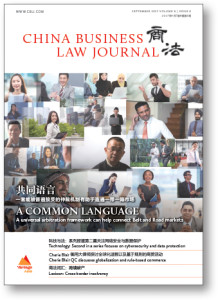We are entering a golden era for dispute resolution practitioners. The increase in cross-border commercial activities has generated an impressive rise in commercial litigation and arbitration. The Belt and Road initiative, proposed by China, is another huge boost to the development of arbitration.
 A common language explores the latest trends in China’s dispute resolution market. Experts believe that a widely accepted arbitration framework is crucial to the success of the Belt and Road, but the way ahead is not easy. Some Belt and Road countries are not signatories to the New York Convention, and many businesspeople are still unfamiliar with arbitration. More effort needs to be devoted to making arbitration a common mechanism that connects business communities along the Belt and Road.
A common language explores the latest trends in China’s dispute resolution market. Experts believe that a widely accepted arbitration framework is crucial to the success of the Belt and Road, but the way ahead is not easy. Some Belt and Road countries are not signatories to the New York Convention, and many businesspeople are still unfamiliar with arbitration. More effort needs to be devoted to making arbitration a common mechanism that connects business communities along the Belt and Road.
At the same time, China is showing more support for overseas arbitration or litigation rulings. Recent cases have shown that the PRC courts’ pro-enforcement approach to overseas arbitral awards, and have also signalled their increased willingness to enforce foreign court judgments on the basis of reciprocity.
The United Nations Commission on International Trade Law (UNCITRAL) has played an important role on the global legal stage for about five decades. Its Model Law on International Commercial Arbitration has set a benchmark for the arbitration legislation in many countries.
Cherie Blair QC, a British barrister and wife of former UK prime minister Tony Blair, spoke at an UNCITRAL conference marking the commission’s 50th anniversary. Adapted from her keynote speech, In the interest of fairness explores global standards for rules-based commerce. Free trade and globalization have contributed much to the prosperity and security of the world, but their side-effects have also provoked a wave of populism and nationalism, especially evident in the West. Globalization should work for all, not just a lucky few. The international arbitration community can also make its contribution to the success of globalization by improving investor-state dispute settlements.
Finally, in the second of a series we are running on the interaction between technology and the legal community, Space invaders examines the vital issues of cybersecurity and data protection, which have come increasingly under the spotlight following the notorious WannaCry and other versions of powerful ransomware have swooped on businesses and individuals around the world. Clear is the urgency in devoting legislative efforts to protecting digital data, but have the regulators kept abreast of the fast-developing technology with effective and reasonable regulation?
The article explores regulatory trends and highlights in key jurisdictions across the Asia-Pacific region. While owners of personal information find comfort in data protection laws, the stringency or vagueness of some data regulations have imposed more of a compliance burden on business. Is your legal team ready for the new challenges?




























